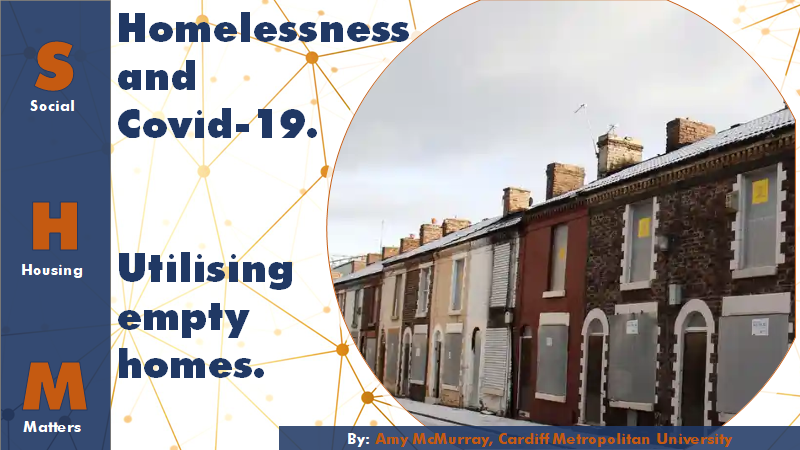By: Amy McMurray ![]() @AmyMcmurray5
@AmyMcmurray5

Homelessness Legislation in Wales
Local authorities have a duty under the Housing Act (Wales) 2014 to prevent homelessness and provide support for people who are homeless or threatened with homelessness. In 2015, homelessness legislation introduced new duties and powers for local authorities to prevent homelessness for anyone at risk within 56 days. Additional powers allow local authorities to use suitable properties in the private sector to accommodate homeless people (Welsh Local Government Association, 2015). Despite the aims to reduce homelessness in Wales with different services and toolkits, it has not eradicated the problem.
Covid-19 and Priority Need
Before March 2020, rough sleepers were not classed as a priority need so did not have immediate access to emergency temporary accommodation. However, Covid-19 led to rules around priority need changing. People who are homeless or sleeping rough are at increased risk and considered extremely vulnerable to the effects of the pandemic. The inability of people who are homeless to self-isolate from the wider community or access basic hygiene facilities became a public health concern from the onset (Baxter, 2020). People without safe and secure accommodation are also more likely to have underlying health conditions making them more susceptible to the complications of the virus. In comparison to people living in secure and decent housing, people who are homeless are three times more likely to acquire chronic health and respiratory problems (Crisis, 2020).
Policy Responses
The UK Government and the devolved nations have rapidly responded to the pandemic through short-term policy change. Since the passing of the Wales Act 2017, Wales moved to a reserved powers model of devolution. This allows the National Assembly for Wales to pass laws on any subject unless it is stated to be reserved by the UK Parliament (Welsh Government, 2016). The Coronavirus Act 2020 conferred new powers on devolved ministers in areas such as health, education, justice and housing. Devolved ministers in Wales quickly used their powers to tackle the issues around Covid-19 and homelessness by implementing new regulations (Institute for Government, 2020). These focused on reducing the exposure of people sleeping rough or homeless who are vulnerable as a result of the pandemic. The Welsh Government increased funding for the social housing sector and called for a stronger focus on collaboration between local authorities and their partners.
Funding
Policymakers announced a £10m emergency fund at the start of the first lockdown and an additional £20m to support second phase plans as set out in the Welsh Government Planning Guidance for Homelessness and Housing Related Support Services (2020). Funding later increased to £50m (Senedd Research, 2020), however, to secure this amount plans must focus on innovation, building, remodelling, and strong partnerships.
Implementation
Local authority action supported roughly 900 people across Wales into emergency temporary accommodation. (Welsh Government, 2020). The accommodation used includes hostels, hotels, and student halls, and is on a scale and of a type, not seen before (Baxter, 2020). Without quick policy responses, rough sleepers may have been some of the hardest hit in society. However, of all the deaths attributable to Coronavirus in Wales, none were recorded as homeless (Office for National Statistics, 2020). The initial response is an accomplishment towards meeting Wales’ vision of ending homelessness, but the accommodation provided is a temporary measure with no guarantee of being sustained.
Sustainability and Empty Homes
The focus on addressing homelessness during the pandemic has magnified the persistent presence of empty homes. Twenty out of every 1000 properties in Wales are laying empty (Admiral, 2018). A recent inquiry into empty homes by the Equality Local Government and Communities Committee suggests there are 27.000 empty properties in the private sector and 1,400 in the social sector (Senedd, 2019).
The challenges around the pandemic and the lockdown experience of 2020 have amplified the urgent need for safe and decent housing for everyone. Empty homes are currently wasted, yet, extremely valuable resource and if utilised could effectively meet the initiatives set out in the Welsh Government’s ‘Phase 2 Planning Guidance (Welsh Government, 2020). At the core of the guidance is “rapid re-housing which starts with providing people with long term housing, and offers additional, sometimes intensive, support if needed to help them retain it and thrive” (Welsh Government, 2020, p.5).
The Welsh Minister for Housing (2020) discusses that providing long-term accommodation will continue to be challenging and all available resources must be used to maximum effect. There is awareness of excellent practice in local authorities and in partnerships between authorities and RSLs to prioritise bringing empty properties into use to help meet challenges.
Community-led Solutions
As previously mentioned, advice around phase 2 plans proposes the need for innovation, strong partnerships, and building/remodelling. These elements link to the concept behind effectively implementing community-led solutions to returning empty homes (Senedd, 2019). Solutions focus on working with community groups to understand their priorities which is crucial to the success of tackling empty homes based on the links with community regeneration (Senedd, 2019). Placing attention on community-led solutions would not only eliminate the burden empty properties have on communities but could be a response to providing sustainable and decent housing during the pandemic. It is this approach that has the advantage of rebuilding communities, providing employment, enhancing skills, and ensuring better energy efficiency to reach decarbonisation goals (Parcell, et al, 2020).
Opportunities
The pandemic has created opportunities to change the way services are delivered it has also demonstrated the effectiveness of close partnerships. Local authorities, registered social landlords and the third sector have saved lives and helped protect some of the most vulnerable in society by efficiently implementing reactive homelessness policies. There is an opportunity for community-led approaches to be considered as part of phase 2 plans to help permanently re-house those accommodated during the first wave of Coronavirus.
Recommendations
The Welsh Government to emphasise the benefits of community-led housing as a solution to bringing empty homes back into use and as a response to providing permanent housing during a global pandemic.
The features of this approach could play a key role in empowering and engaging with people whilst rebuilding sustainable communities. This could be achieved by the Welsh Government placing a focus on the approach in its National Empty Homes Action Plan and detailing the available resources to help grow the approach.
Author bio
Written by Amy McMurray:
My interest in housing developed from my employment as a Health care Support Worker for Cardiff and Vale UHB. As part of my role, I regularly support people who are homeless, have experienced homelessness or living in unsuitable housing. After several years of linking the issue of poor housing to health, I decided to further my learning and became a student at Cardiff Metropolitan University. I have reached the final year of the BSc Housing Studies Degree where I have developed a vast amount of knowledge and integrated my passion for both health and housing into the learning elements of theory, policy, and practice. I am now in the process of my dissertation assessment investigating the role housing can play in supporting the NHS in response to the public health emergency.
References
Admiral (2017) Home Alone. [Online] Available at; https://www.admiral.com/multicover-insurance/home-alone [Accessed 22/11/1010
Baxter. J, Senedd Research, Welsh Parliament, (2020) Coronavirus: Homelessness. [Online] Available at; https://seneddresearch.blog/2020/07/31/coronavirus-homelessness/ [Accessed 22/11/2020]
Crisis UK, (2020) Government Response to Homelessness and Covid-19. [Online] Available at; https://www.crisis.org.uk/media/241941/crisis_covid-19_briefing_2020.pdf [Accessed 22/11/2020]
Institute for Governmant, (2020) Coronavirus and Devolution. [Online] Available at; https://www.instituteforgovernment.org.uk/explainers/coronavirus-and-devolution [Accessed 21/11/2020]
Law Wales (2015) Helping you understand Welsh law. [Online] Available at; https://law.gov.wales/?lang=en [Accessed 22/11/2020]
National Assembly for Wales, (2019) Empty Properties. [Online] Available at; https://senedd.wales/laid%20documents/cr-ld12797/cr-ld12797%20-e.pdf [Accessed 22/11/2020]



